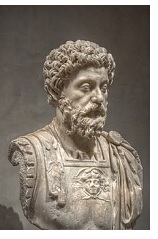WHY WORRY?
BY: GEORGE LINCOLN WALTON, M.D.
CONSULTING NEUROLOGIST TO THE MASSACHUSETTS GENERAL HOSPITAL
III.
MARCUS AURELIUS
Such a body of teachers distinguished by their acquirements and character will hardly be collected again; and as to the pupil, we have not had another like him since.
 Marcus Aurelius Antoninus, the philosopher-Emperor, showed by practice as
well as by precept that the tranquil mind is not incompatible with a life of action. Destined from birth to stand at the head of a great empire
engaged in distant wars, threatened by barbaric invasion, and not without internal dissension, he was prepared not only to command armies but to
govern himself. Fortunately we are not without a clue to his methods - he not only had the best of teachers, but continued his training all through
his life. When we consider his labors, the claim of the busy man of today that he has "no time" seems almost frivolous.
Marcus Aurelius Antoninus, the philosopher-Emperor, showed by practice as
well as by precept that the tranquil mind is not incompatible with a life of action. Destined from birth to stand at the head of a great empire
engaged in distant wars, threatened by barbaric invasion, and not without internal dissension, he was prepared not only to command armies but to
govern himself. Fortunately we are not without a clue to his methods - he not only had the best of teachers, but continued his training all through
his life. When we consider his labors, the claim of the busy man of today that he has "no time" seems almost frivolous.
The thoughts of Marcus Aurelius (of which the following citations are
from Long's translation) were written, not for self exploration, nor from delight in rounded periods, but for his own guidance. That he was in fact
guided by his principles no better illustration offers than his magnanimity toward the adherents of one who would have usurped the throne of the
Cęsars. The observation of Long that fine thoughts and moral dissertations from men who have not worked and suffered may be read, but will be
forgotten, seems to have been exemplified in the comparative oblivion into which the philosophy of Epicurus has fallen.
It is with the ethical side of the philosophy of  Marcus Aurelius that we are concerned, and with that portion only which bears on the question of mental equipoise. Marcus Aurelius that we are concerned, and with that portion only which bears on the question of mental equipoise.
"Begin the morning," he says, "by saying to thyself, I shall meet with the busybody, the ungrateful, arrogant, deceitful, envious, unsocial. All these things happen to them by reason of their ignorance of what is good and evil."
With regard to the habit of seclusion common among the self-conscious, he says:
 "If thou didst ever see a hand cut off, or a foot, or a head, lying anywhere apart from the rest of the body, such does a man make himself, as
far as he can, who is not content with what happens, and separates himself from others, or does any thing unsocial. Suppose that thou hast detached
thyself from the natural unity for thou wast made by nature a part, but now thou hast cut thyself off yet here there is this beautiful provision,
that it is in thy power again to unite thyself. God has allowed this to no other part, after it has been separated and cut asunder, to come together
again. But consider the kindness by which he has distinguished man, for he has put it in his power not to be separated at all from the universal; and
when he has been separated, he has allowed him to return and to resume his place as a part." "If thou didst ever see a hand cut off, or a foot, or a head, lying anywhere apart from the rest of the body, such does a man make himself, as
far as he can, who is not content with what happens, and separates himself from others, or does any thing unsocial. Suppose that thou hast detached
thyself from the natural unity for thou wast made by nature a part, but now thou hast cut thyself off yet here there is this beautiful provision,
that it is in thy power again to unite thyself. God has allowed this to no other part, after it has been separated and cut asunder, to come together
again. But consider the kindness by which he has distinguished man, for he has put it in his power not to be separated at all from the universal; and
when he has been separated, he has allowed him to return and to resume his place as a part."
On the futile foreboding which plays so large a part in the tribulation of the worrier, he says:
"Do not disturb thyself by thinking of the whole of thy life. Let not thy thoughts at once embrace all the various troubles which thou mayest expect
to befall thee; but on every occasion ask thyself, What is there in this which is intolerable and past bearing? for thou wilt be ashamed to confess.
In the next place remember that neither the future nor the past pains thee, but only the present. But this is reduced to a very little, if thou only
circumscribest it, and chidest thy mind, if it is unable to hold out against even this." Again: "Let not future things disturb thee, for thou
wilt come to them, if it shall be necessary, having with thee the same reason which now thou usest for present things."
On the dismissal of useless fret, and concentration upon the work in hand, he says:
"Labor not as one who is wretched, nor yet as one who would be pitied or admired; but direct thy will to one thing only, to put thyself in motion and to check thyself, as the social reason requires."
Regarding senseless fears he counsels:
"What need is there of suspicious fear, since it is in thy power to inquire what ought to be done? And if thou seest clear, go by this way content,
without turning back: but if thou dost not see clear, stop and take the best advisers. But if any other things oppose thee, go on according to thy
powers with due consideration, keeping to that which appears to be just. For it is best to reach this object, and if thou dost fail, let thy failure
be in attempting this. He who follows reason in all things is both tranquil and active at the same time, and also cheerful and collected."
On irritation at the conduct of others:
"When thou art offended with any man's shameless conduct, immediately ask
thyself, Is it possible, then, that shameless men should not be in the
world? It is not possible. Do not, then, require what is impossible. For
this man also is one of those shameless men who must of necessity be in the
world. Let the same considerations be present in thy mind in the case of
the knave and the faithless man, and of every man who does wrong in any way."
Regarding hypochondriac tendencies he reverts to Epicurus, thus:
"Epicurus says, In my sickness my conversation was not about my bodily sufferings, nor did I talk on such subjects to those who visited me; but I
continued to discourse on the nature of things as before, keeping to this main point, how the mind, while participating in such movements as go on in
the poor flesh, shall be free from perturbations and maintain its proper good.... Do, then, the same that he did both in sickness, if thou art sick,
and in any other circumstances;... but to be intent only on that which thou art now doing and on the instrument by which thou doest it."
These quotations will serve to show the trend of the reflections of this remarkable man. After reviewing this epitome of ethical philosophy I might stop and counsel the worrier to study the thoughts of Marcus Aurelius and other philosophers, whose practical suggestions are similar, notwithstanding their diversity of views regarding the ultimate object of the training. I shall venture, however, to elaborate the subject from the present view-point, even though the principles of Marcus Aurelius are as applicable now as they were in the days of the Roman Empire. and other philosophers, whose practical suggestions are similar, notwithstanding their diversity of views regarding the ultimate object of the training. I shall venture, however, to elaborate the subject from the present view-point, even though the principles of Marcus Aurelius are as applicable now as they were in the days of the Roman Empire.
No reminder is needed of the wealth and efficacy of suggestion in the Book which contains the statement that "the Kingdom of God is within you," and that "A merry heart doeth good like a medicine; but a broken spirit drieth the bones." One of its suggestions was paralleled by the philosopher-poet when he wrote:
"Latius regnes avidum domando
Spiritum, quam si Libyam remotis
Gadibus iungas et uterque Poenus
Serviat uni."
Next Page: Analysis of Worry
Previous Page: Epicurus as a Mental Healer
Preface
OTHER ARTICLES ON STRESS AND WORRY:
Return to NoDiet4Me.com
Why Worry - The Psycho-Therapy of Marcus Aurelius
Web Page Copyright 2023 by Donovan Baldwin
Page Updated 9:16 AM Sunday, July 23, 2023
|